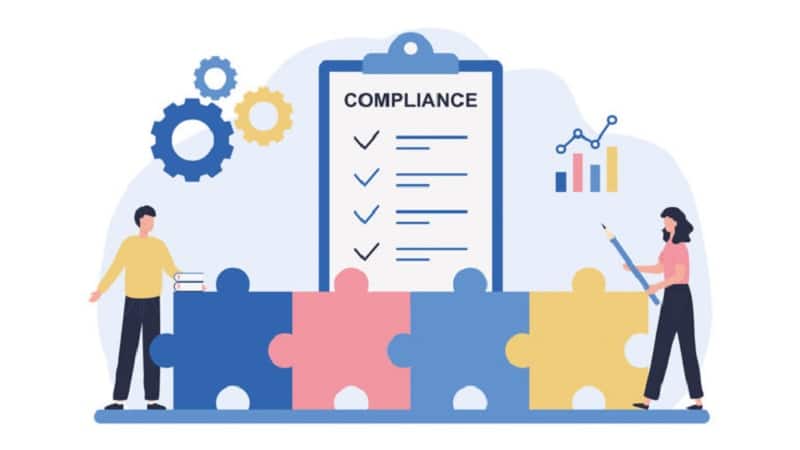
Today's dynamic business environment is marked by rapidly evolving regulatory landscapes. Organizations should follow specific rules and regulations to ensure compliance. Compliance goes beyond simply adhering to legal requirements.
This involves making sure that a company's actions and how it works match up with its important beliefs, inside rules, and the rules of its industry. To effectively address this multifaceted challenge, many companies are turning to integrated compliance solutions.
This article deals with the concept of integrated compliance software, the array of benefits they offer, and why they have become indispensable tools for modern businesses.
Understanding Integrated Compliance Software

Integrated compliance software constitutes a holistic approach that amalgamates various tools, technologies, and strategies to manage and streamline an organization's compliance processes.
These solutions aim to unify compliance efforts across different departments and functions, providing a centralized and harmonious framework for overseeing regulatory requirements.
The Complex World of Compliance
Compliance in today's business landscape is anything but straightforward. Companies must contend with an ever-expanding array of regulations, spanning industry-specific requirements, data privacy legislation, anti-money laundering (AML) regulations, and much more.
Non-compliance with these intricate regulations can lead to substantial fines, legal ramifications, damage to an organization's reputation, and the erosion of trust among its customers. Furthermore, the regulatory environment is in a perpetual state of flux, with updates and alterations occurring at a frequent cadence.
The Challenges of Fragmented Compliance
In the past, many organizations managed compliance in a disjointed manner. Different departments operated autonomously, handling various facets of compliance independently, often relying on manual processes and disparate tools. This fragmented approach gave rise to a host of challenges:
Inefficiency: Managing compliance in isolated silos resulted in duplicative efforts, resource wastage, and an increase in administrative burdens.
Risk of Non-Compliance: The absence of a centralized system made it challenging to ensure consistent compliance across the organization.
Lack of Transparency: Transparency and visibility into compliance activities were severely restricted, making it challenging to identify potential issues or areas that required enhancement.
Costly Errors: Manual data entry and document management were rife with errors, leading to expensive compliance mishaps and oversights.
Benefits of Integrated Compliance Software

Integrated compliance software offers many advantages, which help organizations surmount the hurdles posed by fragmented compliance approaches. Here are some of these key benefits in greater detail:
Centralized Compliance Management
Integrated solutions furnish organizations with a centralized platform for the monitoring and management of all compliance-related activities. This centralized approach facilitates a unified perspective on compliance endeavours across the organization, fostering improved coordination and the reduction of duplicated work.
Enhanced Efficiency
By automating repetitive tasks and workflows, integrated compliance software brings about a substantial boost in efficiency. Tasks such as data collection, reporting, and documentation can be streamlined, resulting in substantial time and resource savings.
Real-time Monitoring and Reporting
Integrated solutions offer real-time monitoring capabilities, permitting organizations to remain current with compliance requirements and any alterations in regulations. Real-time reporting also enables swift responses to potential compliance issues as they arise.
Reduced Risk of Non-Compliance
Integrated compliance software provides clear and consistent enforcement of compliance requirements. Automated alerts and notifications serve as a safeguard, ensuring that deadlines and obligations are met, thus diminishing the risk of non-compliance.
Improved Data Accuracy
Manual data entry and management procedures are susceptible to introducing errors into compliance processes. Integrated solutions play a pivotal role in maintaining data accuracy through automation, minimizing the likelihood of costly errors.
Enhanced Security and Data Privacy
Given that compliance often necessitates the handling of sensitive data, integrated solutions typically incorporate robust security features. These features serve as a bulwark, shielding confidential information from breaches and unauthorized access.
Scalability
Integrated compliance software is adaptable to an organization's requirements and can scale accordingly. Whether an organization is a small business or a multinational corporation, these solutions can flexibly accommodate their compliance prerequisites.
Regulatory Updates Made Easy
Regulatory alterations are an enduring reality. Integrated solutions frequently encompass features that facilitate seamless updates to compliance procedures and documentation, ensuring the organization's ongoing adherence to new regulations.
Case Studies: Real-World Success Stories
To further elucidate the tangible benefits of integrated compliance software, here are a few real-world success stories. These examples illustrate how organizations have streamlined their compliance efforts and experienced remarkable enhancements:
Case Study 1: Financial Institution
A global financial institution confronted the formidable task of complying with stringent anti-money laundering (AML) regulations across multiple jurisdictions. Following the implementation of an integrated compliance solution, the institution realized the following results:
- A 50% reduction in false positives in transaction monitoring, leading to more efficient investigations.
- Enhanced audit trail visibility, culminating in faster regulatory reporting.
- Facilitated cross-border collaboration among compliance teams, fostering knowledge exchange and sharing best practices.
Case Study 2: Healthcare Provider
A big healthcare provider wanted to make sure they were following the rules (HIPAA) when handling lots of patient information. Upon adopting an integrated compliance solution, the provider witnessed:
- Streamlined access controls for patient data, ensuring strict adherence to privacy regulations.
- Diminished administrative overhead through automated compliance workflows, freeing up resources for patient care.
- Augmented patient trust and data security, bolstering the organization's reputation.
Integrated compliance solutions have unequivocally emerged as indispensable tools for modern businesses grappling with the intricate and ever-evolving realm of regulatory compliance. These solutions offer several benefits, including centralized management, increased efficiency, real-time monitoring, and more. These advantages help organizations meet compliance requirements, reduce risks, and improve how they operate.










